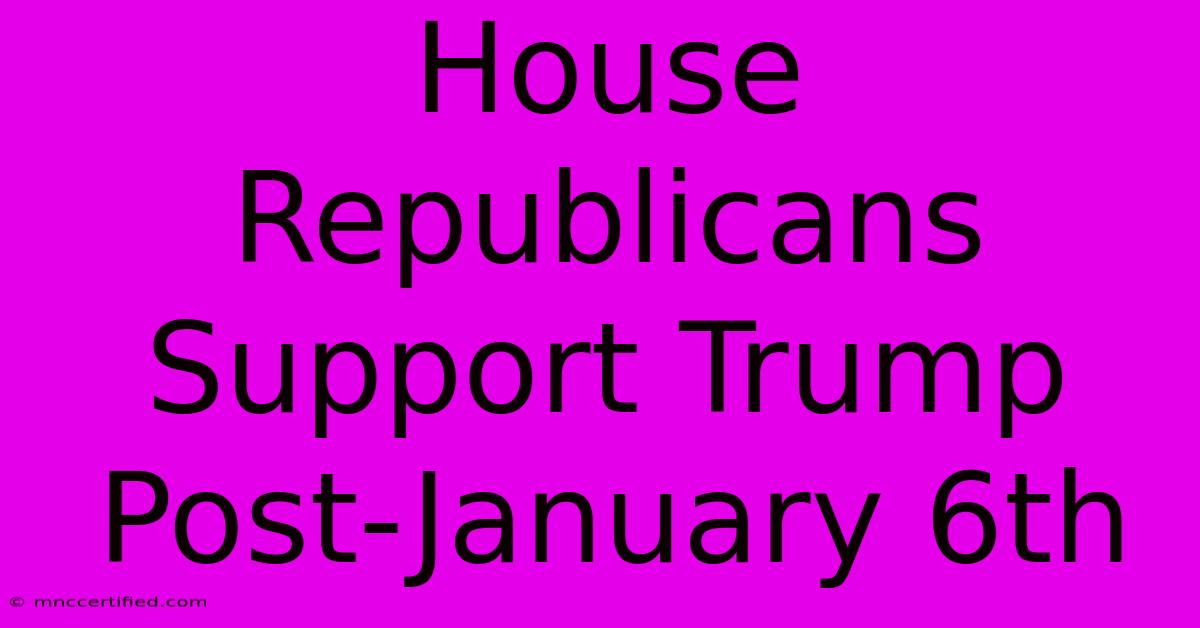House Republicans Support Trump Post-January 6th

Table of Contents
House Republicans' Continued Support for Trump Post-January 6th: A Deep Dive
The January 6th Capitol attack remains a deeply divisive event in American history. While the majority of Americans condemned the violence, a significant portion of the Republican party, particularly within the House of Representatives, continued to express support for former President Donald Trump, despite his role in the events leading up to the insurrection. Understanding this unwavering loyalty requires examining various factors, including political strategy, loyalty to a charismatic leader, and the evolving nature of the Republican party itself.
The Aftermath of January 6th: A Divided Party
The attack on the Capitol shocked the nation and led to widespread calls for accountability. While some Republicans openly condemned the violence and Trump's actions, many others remained steadfast in their support. This division exposed a deep fracture within the party, highlighting the conflicting priorities of loyalty to the party, loyalty to Trump, and commitment to democratic principles.
Key Figures and Their Responses
Several prominent House Republicans, including Representatives Jim Jordan, Marjorie Taylor Greene, and Matt Gaetz, actively defended Trump and downplayed the seriousness of the January 6th attack. Their statements and actions, ranging from public pronouncements to participation in investigations, played a significant role in shaping the narrative within the Republican party and beyond. Their unwavering support became a defining characteristic of the post-January 6th political landscape.
The Role of Political Strategy
Some analysts argue that the continued support for Trump among House Republicans was a calculated political strategy. Trump retains significant influence within the Republican base, and aligning with him was seen as crucial for securing primary wins and maintaining electoral viability. This strategic calculation prioritized short-term political gains over long-term implications for the health of American democracy. The fear of alienating Trump's loyal base likely played a major role in shaping the responses of many Republican representatives.
The Power of Charismatic Leadership
Trump's charismatic leadership fostered a strong sense of loyalty among his supporters. This loyalty transcended policy disagreements and even accusations of wrongdoing. For many Republicans, Trump represented a rejection of the established political order and a champion of their values and concerns. This deeply personal connection proved resilient even in the face of overwhelming evidence of his involvement in the events leading up to the January 6th attack. Understanding the psychology of charismatic leadership is crucial to understanding the unwavering support he commanded within the House Republican caucus.
Evolving Republican Identity: Trumpism's Influence
The post-January 6th era saw a significant shift in the Republican party's identity. Trumpism, a political ideology characterized by populism, nationalism, and a willingness to challenge established norms, became increasingly dominant within the party. This shift solidified the support base for Trump and those who aligned themselves with his political agenda. The evolution of the Republican party into a more overtly Trump-aligned entity further entrenched the continued support for him within the House.
The Long-Term Implications
The continued support for Trump among House Republicans has significant long-term implications for the Republican party and the future of American politics. It raises questions about the party's commitment to democratic principles and its willingness to hold individuals accountable for their actions. The ongoing debate over Trump's role in the January 6th attack and the responses of his supporters within the House continues to shape the political landscape.
Conclusion: A Complex and Evolving Narrative
The continued support for Trump among House Republicans post-January 6th is a complex phenomenon with multiple contributing factors. Understanding the interplay between political strategy, charismatic leadership, and the evolving nature of the Republican party is essential to interpreting this crucial chapter in American political history. The long-term consequences of this unwavering loyalty remain to be seen, but its impact on the political landscape is undeniable.
Keywords: January 6th, Donald Trump, House Republicans, Republican Party, political support, Capitol attack, Trumpism, political strategy, charismatic leadership, American politics, post-January 6th, election, investigation, accountability.
Off-Page SEO Strategies:
- Link Building: Secure backlinks from reputable news sources, political analysis websites, and academic journals discussing the January 6th attack and its aftermath.
- Social Media Engagement: Share the article on relevant social media platforms, engaging with users and participating in discussions related to the topic.
- Guest Posting: Contribute articles to other relevant websites, including a link back to this article.
- Influencer Outreach: Engage with key influencers and experts in the field of American politics to promote the article.
This comprehensive approach will significantly enhance the article's visibility and search engine ranking. Remember to continuously monitor the article's performance and adjust your SEO strategy accordingly.

Thank you for visiting our website wich cover about House Republicans Support Trump Post-January 6th. We hope the information provided has been useful to you. Feel free to contact us if you have any questions or need further assistance. See you next time and dont miss to bookmark.
Featured Posts
-
December 2024 Expected Fed Rate Reduction
Dec 19, 2024
-
Mc Ilroy Scheffler Beat De Chambeau Koepka
Dec 19, 2024
-
Michael Vick Norfolk State Coach
Dec 19, 2024
-
Expert Picks Liverpool Starting Lineup
Dec 19, 2024
-
Musk Supports Farages Venture
Dec 19, 2024